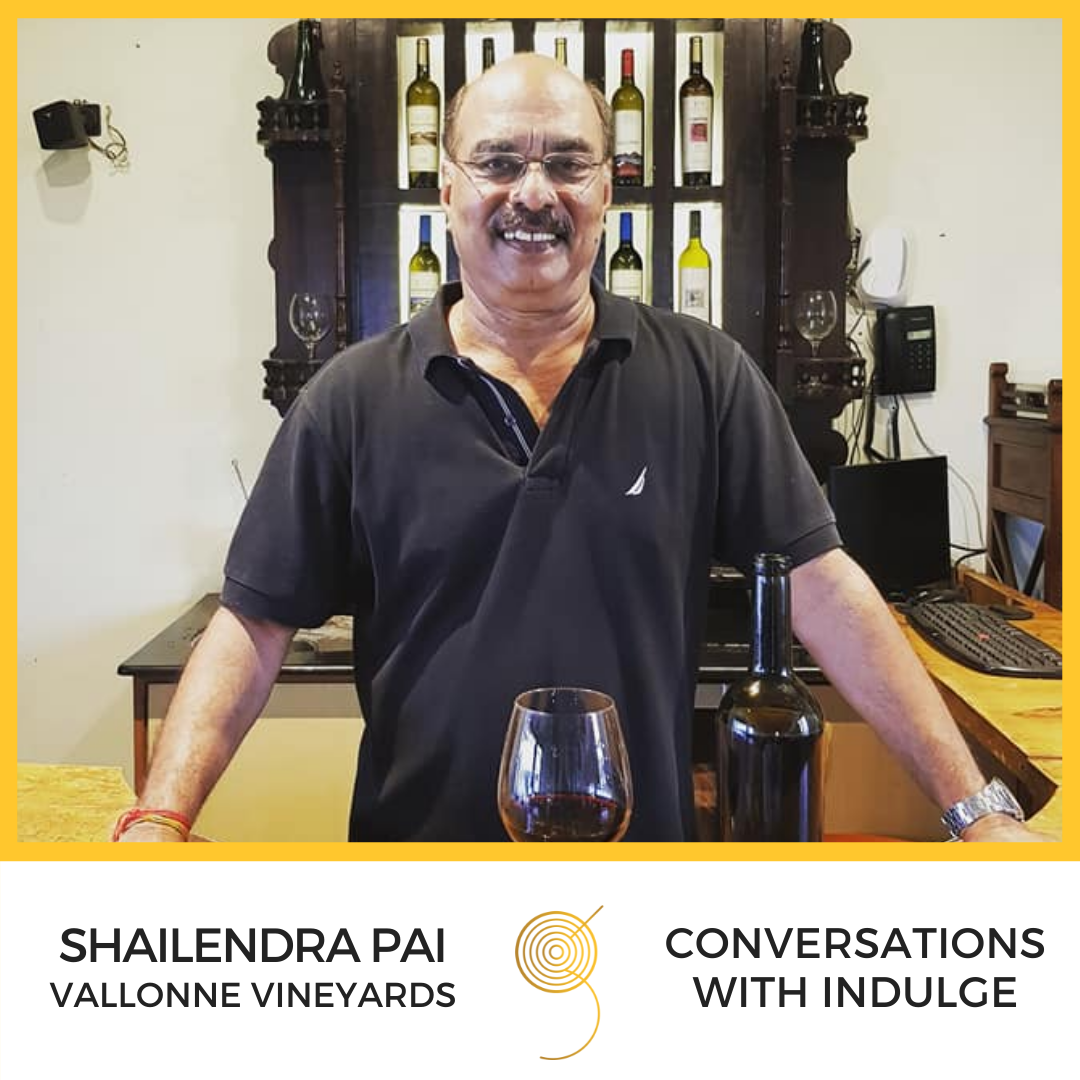Mr. Shailendra PAI is India’s first wine professional to become a vintner. As the Vice President of Champagne India, the first sparkling wine producing unit in the entire SE Asia, he was responsible for taking wine to various market of the world including UK, Germany, Sweden, Denmark, USA, Japan, Singapore etc. With four decades of experience in the wine business, he decided to pursue his long cherished dream of setting up a winery where the focus would be on quality and a holistic wine experience and in 2006, he set up Vallonné Vineyards as India’s first boutique winery which is now recognised by wine connoisseurs and consumers as a producer of quality wines.
What drew you to the wine industry in the first place?
In the year 1986, I would read about the late Mr. Shyamrao Chougule in the papers and magazines. He had set up a winery that was to make sparkling wine for the first time in India and I was rather fascinated by his lifestyle—fast cars, guns, a lifestyle with wines. That attracted me to Champagne India Ltd, a wine company he had promoted. And that was my initiation into the world of wines.
From your early days at Chateau Indage to now at Vallonne Vineyards, what’s the biggest change you’ve seen in the way Indian wines are perceived?
Whilst I worked with Champagne India there was a huge curiosity about wines. However, it was difficult to initiate trials as the word ‘wine’ was alien to the Indian consumers. It was difficult to sell wine.
Today, there is far more awareness about wines and definitely a huge interest. The curiosity has been converted into interest. Today, there are several homegrown wineries and many of these produce very good quality wines which are at par, or sometimes, even better than the wines from traditional wine producing regions.
While the general perception is that Indian wines are not very good and as good as French or Italian or Californian or South African wines, there are several people who are recognising the high quality and potential of Indian wines and choosing to drink Indian wines. We have had several guests who have come to us with some apprehension about the quality of Indian wines and after drinking our wines, are now totally converted into Indian wine drinkers. So, the perception is definitely changing.
International wine experts, judges at competitions, wine buyers are acknowledging that there are some Indian wines that excellent in quality and that is also positively impacting the way Indian consumers view of wines. Wine experts and trainers also have a positive influence of consumers’ choices about Indian-made wines; sommeliers are also promoting Indian wines.
The winery tours and wine appreciation sessions that we conduct are very personalised and that also helps introduce our wines to people. We talk about what goes into making every bottle of wine and conduct these very detailed tasting sessions which has, in our experience, convert a lot of hard liquor drinkers into wine drinkers. So, the change in perception is very positive and encouraging.
What is Vallonne Vineyards winemaking style, and how would you define its philosophy?
Innovation and experimentation—I think that is what best defines our style of winemaking. Vallonne Vineyards are constantly experimenting with newer techniques, blends and wines. So, when we launched our rosé, we were the first one to make a rosé from the Cabernet Sauvignon; in 2011, we made the first ever Reserve Malbec in the country; our dessert wine, Vin de Passerillage is the only dessert wine in the country made using the painstaking straw wine technique where mature Chenin Blanc grapes are manually sun-dried in straw huts for a month. We require 150 people to work over a week to tie bunches of these grapes and hang them up for drying.
Even at a more subtle winemaking level, which is not evident to consumers, but which impacts the quality greatly, we constantly innovate and try something new.
The orientation is French-style wines. For the first six years, we had a winemaker from Bordeaux who set the protocols that continue to be followed today, however, with certain improvements/alterations according to the vintage, grapes and style.
Our wines at Vallonne Vineyards are mostly dry and off-dry and we put a lot of emphasis on our reserve red wines which are aged in premium French oak barrels. In a very good vintage, we produce our grand reserve range called Anokhee where the wines, which have a great potential to improve with time, are aged in barrel and oak for a minimum of four years.
As India’s first boutique winery, Vallonne Vineyards have been true to our philosophy of producing very high quality wines albeit in small quantities.
What keeps you going in this line of profession?
My love for wines and the love that Vallonné receives from people!
As you’d know, this is a very tumultuous and difficult industry with very deep lows and sharp highs. We don’t give in to pressures from the trade / restaurants for deep discounts and schemes because we believe in our wines and know that consumers, who appreciate our wines, will always find a way to get our wines. So, the growth for us has been rather slow and organic but it is also steady and quality growth. The pandemic and the lockdown did deal a blow to the business in a big way but all the hardships are worthwhile when I see the appreciation that wine lovers shower on us—for our wines and the entire experience that we offer at Vallonné.
What’s your favourite tipple at the end of a busy day?
Vallonné wines—Riesling, Viognier, Cabernet Sauvignon or Syrah. For me, nothing can beat the experience of sitting at our restaurant, watching the sun set behind the mountains and the birds fly over the vineyards while I sip on wine. Since we all love experimenting, our winemaker Sanket, our winemaker, often tries very limited quantities of different blends for me.
What’s your advice to young professionals seeking knowledge in this discipline?
Wine is a a sunshine industry and India will surely be amongst the foremost producer of wines in the future. So, there is huge potential for young professionals in the field. But the world of wines cannot be compartmentalised into just wine making or your work as a sommelier or a marketing and sales executive. Get a holistic knowledge of the business and the product—right from viticulture and wine making, to being able to help your consumer taste and appreciate the wine, pair it with food.
There is immense potential for in the field of sales, wine promoters, and educators. It needs passion and dedication. Like I always emphasise, wine is just not a product but a living being which has to be treated and handled with a lot of care. It has its moods and its good days and not-so-great days so treat it like a living entity. Be proud of Indian wines and be the ambassadors of the Indian wine business.

